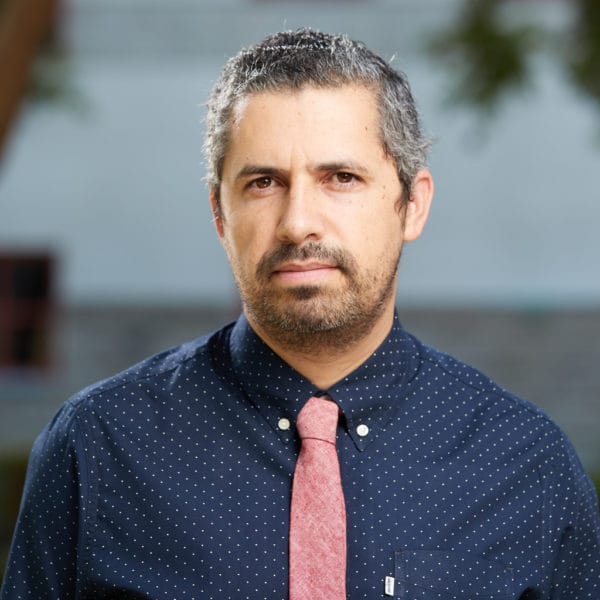Romeo Guzmán is an assistant professor in history at Claremont Graduate University. His research seeks to bridge Chicanx historiography and scholarship on modern Mexico by offering transnational histories of Mexican migrants and Mexican-Americans. His research interests include citizenship, migration, sport, public history, and digital humanities.
Guzmán’s public history work strives to transform how underrepresented communities enter the historical record and to redefine the role of both historians and archives in society. Before arriving at CGU, Guzmán was an assistant professor at California State University, Fresno (2016 to 2020), where he founded and directed The Valley Public History Initiative: Preserving our Stories. In his capacity as the director, he worked with students, faculty, and community members to launch “Straight Outta Fresno: From Popping to B-boys and B-girls” and “The Other Football: Tracing the Game’s Roots and Routes in the San Joaquin Valley.”
Since 2012 he has co-directed, with Carribean Fragoza, the South El Monte Arts Posse’s public history project “East of East: Mapping Community Narratives in El Monte and South El Monte,” which has resulted in the publication of East of East: The Making of Greater El Monte (Rutgers 2020). Employing traditional historical scholarship, oral history, creative nonfiction, and original art, East of East provides a radical new history of El Monte and South El Monte, showing how interdisciplinary and community-engaged scholarship can break new ground in public history.
His public history projects have received funding from California Humanities, Los Angeles City Department of Cultural Affairs, National Performance Network, National Endowment for the Humanities, and have been reviewed or featured on NPR, KCRW, The California Report, The Metropole, KCET Departures, San Gabriel Valley Tribune, Fresno Bee, and others.
Guzmán co-edits Boom California, an open-access and public facing online journal of UC Press. He is currently working on two articles about the Great Depression, repatriation, and Mexican-Americans. Guzmán’s book in progress, Orphans of the Nation: Mexican-Americans, Transnational Citizenship, and Belonging, the 1920s to 1940s, examines how migrant families used formal politics and daily and cultural practices to engage U.S. and Mexican citizenship.
A resident of the San Gabriel Valley, he is proud graduate of Garey High School and Mount San Antonio Community College.
Romeo Guzman, Carribean Fragoza, and Samine Joudat, Writing the Golden State: The New Literary Terrain of California, Angel City Press, Fall 2024
“Paper Trails: Repatriates, Mexican Consuls, and Transnational Mobility during the Great Depression,” Journal of American History, 2022
“’Imaginemos Cosas Chingonas’: Building The Other Football Public History Project.” Teaching Public History, edited by Julia Brock and Evan Faulkenbury, (UNC Press, 2023)
Co-authored with C. Fragoza, A. Cummings, and R. Reft. East of East: The Making of Greater El Monte. Rutgers, 2020.
“The transnational life and letters of the Venegas family, 1920s to 1950s.” In Migrant Letters: Emotional Language, Mobile Identities, and Writing Practices in Historical Perspectives, edited by M.J. Borges and S. Cancian. Routledge, 2017.
“Field of Dreams: Migrant Futboleros in Greater Mexico.” Boom California, (2018).
“Rebel Archive: A History of La Casa de El Hijo Del Ahuizote.” In Regeneración: Three Generations of Revolutionary Ideology, edited by P. Tompkins Rivas. Mexico City: Vincent Price Art Museum and La Case de El Hijo del Ahuizote, 2018.
Creative non-fiction
“Team Zapata.” Entropy, (2018).
Co-authored with C. Fragoza and D. Flores Magón. Burn the Wagon: Writings from Greater El Monte. Mexico City: La Casa de El Hijo del Ahuizote and South El Monte Arts Posse, 2017.
Approaches to Public History: Centering Marginalized Communities
